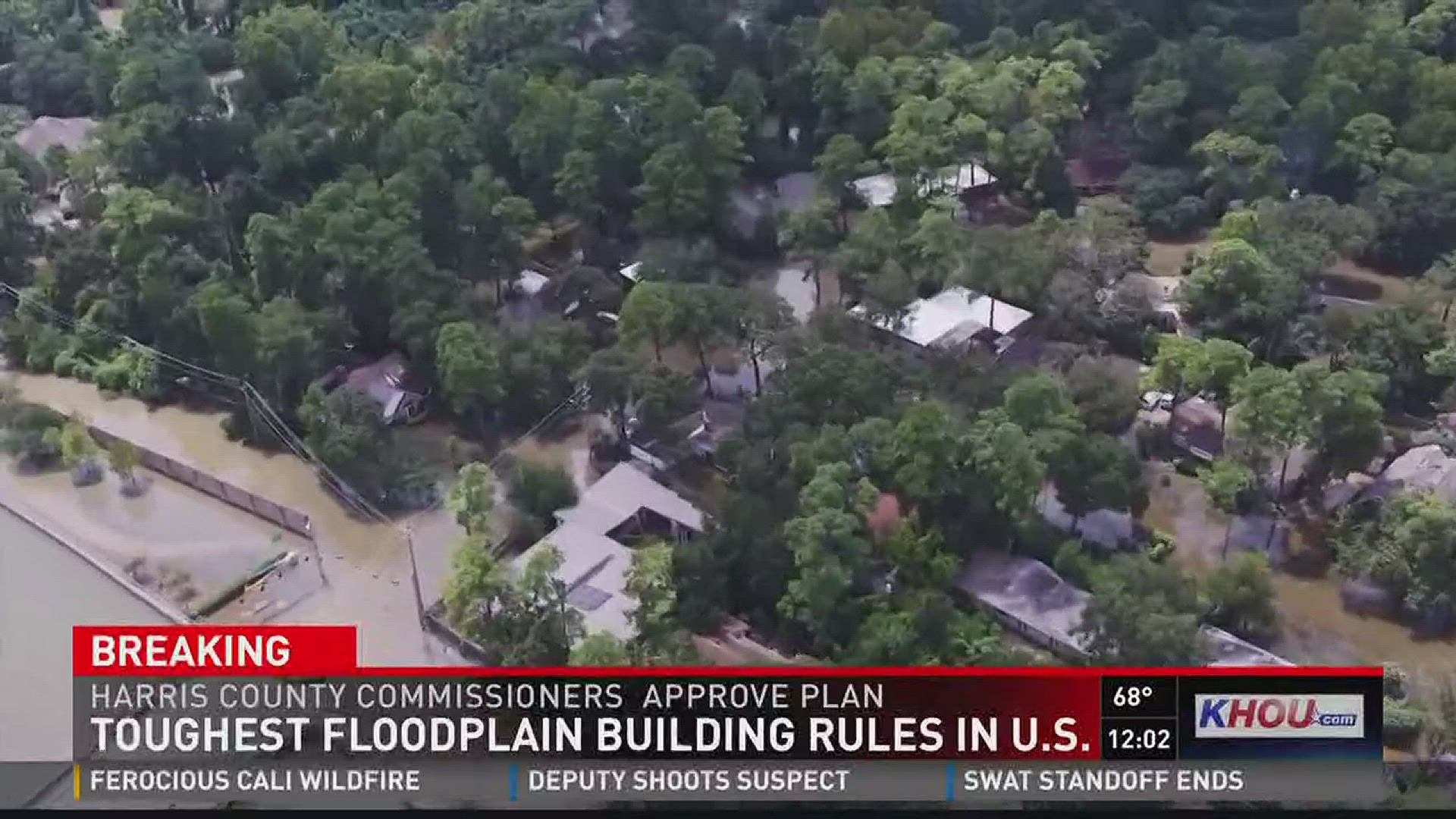Could building higher homes help protect Harris County from flooding damage?
On Tuesday, County Commissioners approved a proposal that requires developers to elevate any new buildings within the 500-year floodplain, or the area where there’s a 0.2-percent chance of a flood occurring in any given year.
Some developers, county officials and historians believe it’s a step in the right direction. But can the Houston region engineer their way out of future flooding damage?
Harris Co. Commissioners approve tighter rules on floodplain development. Judge @EdEmmett calls them the toughest in the nation. #KHOU11 pic.twitter.com/qlg9jSH9wj
— Adam Bennett (@AdamBennettKHOU) December 5, 2017
“We had moved back in, and then it did it again,” said Jo Crass, whose Cypress-area home of 10 years go hit with a one-two punch: first, the Tax Day floods in 2016, then Harvey in 2017.
“Personal items like great-grandmother’s photographs, you can’t replace that,” said Crass, whose home took on a foot of water during both floods. “That’s what you grieve over.”
What Crass frets over, like many people, is that Harvey isn’t the end -- that the Houston area will continue to deal with storms and damage.
Mike Vance, Program Director for the Heritage Society, says flooding has always been inked into Houston’s history.
“We’re not going to engineer the rain away, but we can engineer our way to a much better impact,” Vance said.
Vance says history proves strategy can work. One success story, he says, is the raising of Galveston by as much as 15 feet with the seawall construction after the 1900 hurricane wiped out the city.
“By 1915 when they got another storm that was roughly just as strong, not nearly the damage, certainly not nearly the death,” Vance said.
In Houston, Vance points to the construction of the Addicks and Barker reservoirs to protect downtown after hundreds of blocks flooded in 1929 and 1935. Vance says construction was the last flood control project on that scale since World War II.
“It’s just going to take a little bit of gumption and some tough decisions, but yes, I think it’s doable,” Vance said.
In October, Harris County Judge Ed Emmett released his “15-point plan” on how to lessen future flooding damage after three 500-year floods in two years.
“I hope we can maintain that ‘wow’ factor and put it to good use for years to come and not fall back into complacency,” said Emmett during his State of the County address on Nov. 28.
One of those plans, which the Commissioners Court could vote on Tuesday, would force developers building inside of a 500-year flood plain to raise the homes 24 inches above flood level.
In some areas, that’s an elevation increase of 8 feet.
Crass’ home sits in the 500-year floodplain.
“There (are) no guarantees,” said Crass when asked if she thinks her home would have been spared from Harvey had it been 24 inches higher. “I really don’t have any way of knowing that for sure, but I think it would have considerably helped it, if not prevented it, yes.”
Ed Wolff, President of Beth Wolff Realtors and Government Affairs Chair of the Houston Association of Realtors, believes every county in the region should take a hard look at development “across the board."
“I think in the long run, building that way will pay off,” Wolff said. “Just because of residual value, somebody will pay you for a house that’s been prepared in a way that will hopefully avoid future impact or diminish future impact from flooding.”
Now Wolff says his organization is staying on elected officials to make sure this type of flood damage will stay part of Houston’s history instead of becoming its future.
“We as citizens have to be more active in getting our government entities to pay attention to these problems when there is not a heavy rainstorm,” Wolff said.
Harris County’s proposed elevation requirements would only cover new development outside of Houston city limits. Still, that’s an area with more people than 26 states, 1.8 million, and where most of the development since 2000 has happened.
Emmett hopes a proposed third reservoir along Cypress Creek, and other elements of his 15-point plan, could be funded with money from the state’s $10 billion Rainy Day Fund.
Emmett says Harris County voters may decide on a flood control bond package in 2018 potentially worth more than $1 billion.

